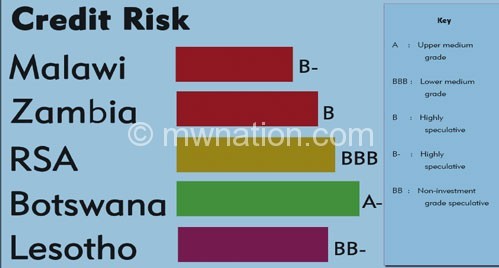Fitch rates Malawi as highly speculative

Credit rating agency Fitch has rated Malawi as B minus—non investment highly speculative grade—in both long-term local and foreign currency, according to countryeconomy.com.
Fitch, one of the three international credit rating agencies apart from Moody’s and Standard & Poor’s (S&P), has, however, rated neighbouring Zambia, Uganda, Rwanda and Seychelles ‘B’, a notch above Malawi . Lesotho and Angola have BB minus. Top rated economies in the region include Namibia with ‘BBB minus’ and South Africa with ‘BBB’.
But in 2009 according to Reuters, Fitch simultaneously affirmed and withdrew Malawi’s sovereign rating of B minus while in 2007 the credit rating agency upgraded the economy’s long-term foreign currency grade to B minus with a stable outlook, from a previous ‘CCC’.
Then, government said although the rate was nothing to be happy about the upgrade would boost donor confidence and foreign investment, and was a signal to the rest of the world that Malawi is willing to repay debt.
Commenting on the rating, a local renowned investment expert responding in an email on Thursday said a country credit rating provides insights on fiscal and health of a country.
The expert noted that a risk category assesses the likelihood of the country or an entity guaranteed by the country defaulting on its debts.
“The sovereign risk rating is informed by scores including a combination of political, policy, cyclical and structural variables. The low ratings indicate weak public financial management such as the cash-gate and high public debt levels compared to other countries. The kwacha depreciation could play a role,” said the expert.
The analyst added that the suspensions of aid inflows, a source of revenue to Malawi, and the reduced access to concessional external financing have worsened the rating.
Highlighting on how the economy can improve its ratings, he said that there is need to improve public financial management, diversify the economy and reduce demand for domestic borrowing.
Government heavily borrowed from the local market especially at the end of last year while the external debt stock at the end of the third quarter of 2013 rose to $1.3 million approximately 28.4 percent of GDP.
And according to the International Monetary Fund (IMF), Malawi is projected to have a financing gap of K32 billion (about $80m)
Government is, however, committed to cut some costs to meet the gap.
But commenting on the country’s debt levels, Ministry of Finance spokesperson Nations Msowoya recently said government has put in place measures to control domestic borrowing.
Msowoya said that government agreed with the International Monetary Fund (IMF) that government should implement a tight fiscal stance by reduced domestic borrowing and only retire existing debt.





